Exploring strange new worlds. Understanding the origins of the universe. Searching for life in the galaxy. These are not the plot of a new science fiction movie, but the mission objectives of the James Webb Space Telescope, the long-awaited successor to the Hubble Space Telescope.
On Christmas, NASA launched the Webb from French Guiana in partnership with the European Space Agency and the Canadian Space Agency. Now the telescope is on its way to a point nearly a million miles away from the Earth.
On its journey, the telescope has to complete a difficult mechanical maneuver: assembling itself. The telescope is so large it needed to launch folded up inside a rocket. Over the course of several weeks, it needs to unfurl its various components, from its sunshield to its mirrors. According to NASA, more than 300 potential technical problems, or “single point failures,” could potentially doom the mission.
But when it fully deploys in space, the Webb will usher in a new age of astronomy, scientists say, and show humanity things it has never seen before.
“The Webb represents the culmination of decades, if not centuries, of astronomy,” says Sara Seager, a planetary scientist and astrophysicist at MIT. “We’ve been waiting for this a very long time.”
Scientists started thinking about a follow-up even before the Hubble Space Telescope launched in 1990. After more than three decades in space, it’s unclear how much longer this boundary-breaking satellite will be able to scan and photograph the universe.
The Webb was originally supposed to launch in 2010 and cost around $1 billion. Its price tag ballooned to $10 billion, and it’s way overdue. But the wait will be worth it, at least according to the scientists who expect new and revealing glimpses of our universe.
“We’re going right up to the edge of the observable universe with Webb,” says Caitlin Casey, an assistant professor of astronomy at the University of Texas at Austin. “And yeah, we’re excited to see what’s there.”
The Webb will surpass the Hubble in several ways. It will allow astronomers to look not only farther out in space but also further back in time: It will search for the first stars and galaxies of the universe. It will allow scientists to make careful studies of numerous exoplanets — planets that orbit stars other than our sun — and even embark on a search for signs of life there.
The Webb is a machine for answering unanswered questions about the universe, for exploring what has been unexplorable until now. Here’s a guide to what the Webb is capable of.
Post Contents
The Webb’s golden mirror is a giant leap for telescopes of its kind
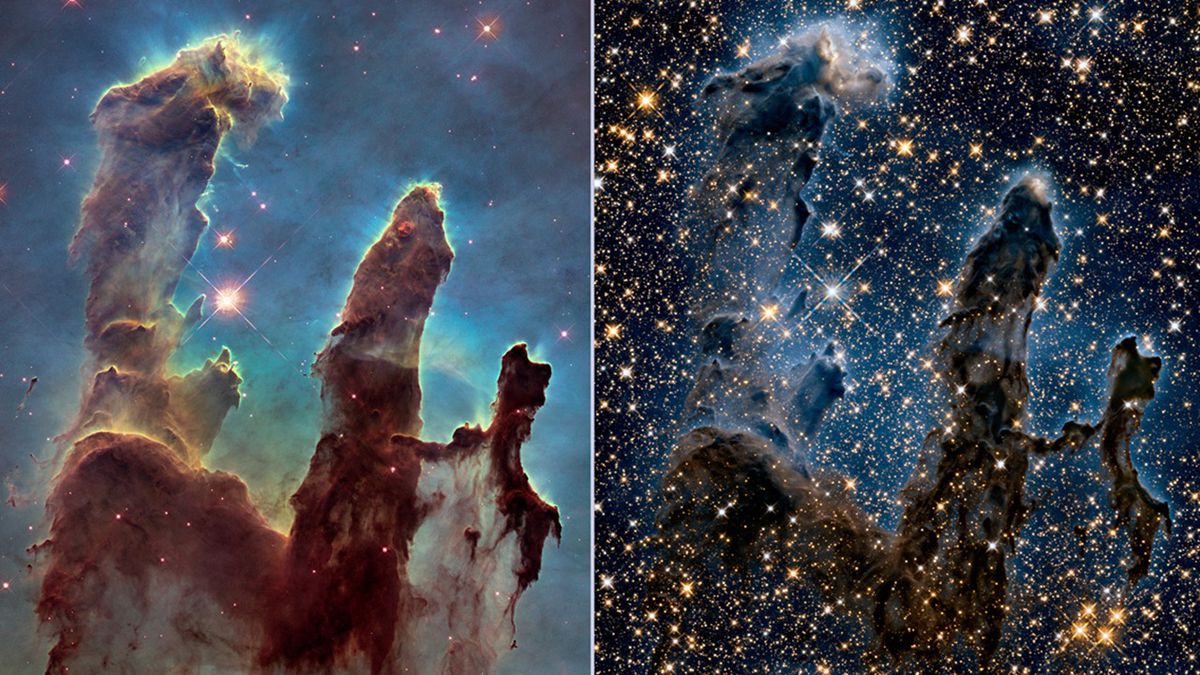
The launch of the Hubble Space Telescope, named after famed astronomer Edwin Hubble, was itself a huge leap forward for astronomy. Here on Earth, astronomers seek out remote mountaintops and deserts to build major telescopes for the best chance of viewing a dark sky away from pollution and bright lights. But their view is still marred by the slight haze and luminescence of the Earth’s atmosphere. Space is “the ultimate mountaintop,” as NASA explains. There’s no better view of space than the one from, well, space.
Hubble has meant so much during its 30-year run. For one thing, it’s sent us unforgettable, jaw-droppingly beautiful images like those of the Lagoon Nebula and the Pillars of Creation.
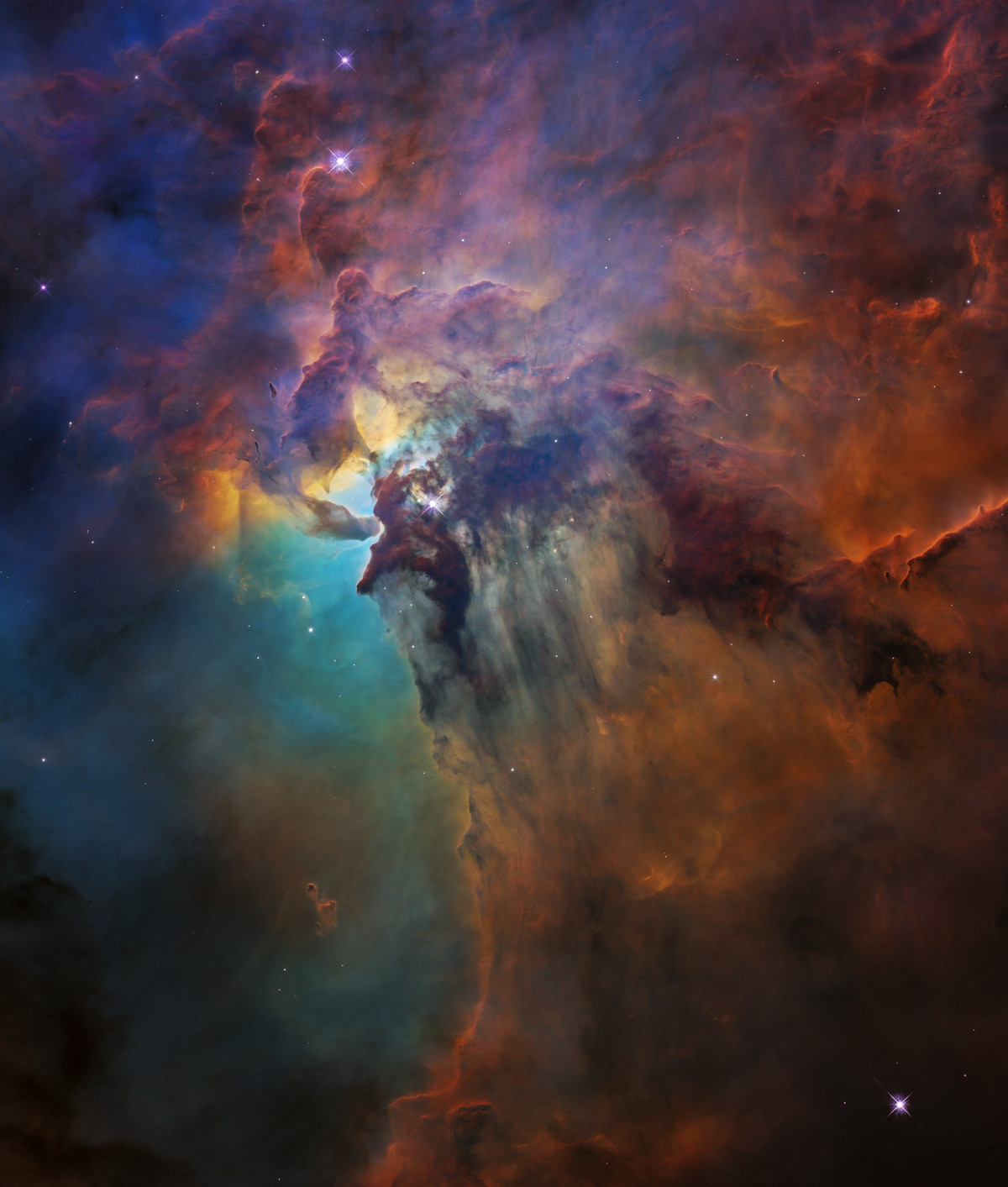
It’s also taught us about the age of the universe, about what happens when stars explode, about black holes. It helped establish many of the boundaries that the Webb hopes to push. Most powerfully, its observations have led scientists to believe the universe is expanding at an accelerating rate, propelled by something so mysterious that scientists simply call it “dark energy.”
The Webb is, controversially, named for the man who led NASA in the decade leading up to the moon landing. James Webb, its namesake, was a government bureaucrat at a time when it was federal policy to fire gay staffers. While current NASA administrator Bill Nelson has said that the agency has “found no evidence at this time that warrants changing the name of the James Webb Space Telescope,” more than 1,700 people have signed a petition accusing Webb of complicity in a discriminatory policy.
Namesake aside, the technological achievement of NASA’s newest telescope is uncontroversial. It’s set to take the success of the Hubble a step further.
“What we’re going to get is a telescope that’s about 100 times more powerful than Hubble,” says Amber Straughn, an astrophysicist at NASA who works on the Webb.
How?
The Webb improves on Hubble in two key ways. The first is just its size: Hubble was about the size of a school bus, whereas Webb is more like the size of a tennis court. “This thing is enormous,” Straughn says. “Webb is by far the biggest telescope NASA’s ever attempted to send into space.”
But it’s not just the total size of the contraption that matters. When it comes to reflecting telescopes, the key component is the size of its curved mirror. “You could sort of think of a telescope mirror like a light bucket,” Straughn says. The more light you can collect in this bucket, the fainter and farther-away things you can see in the universe.
Hubble’s mirror was an impressive 7.8 feet in diameter. Webb’s beautiful, gold-hued mirrors combine for a diameter of 21.3 feet. Overall, that amounts to more than six times the light-collecting area.
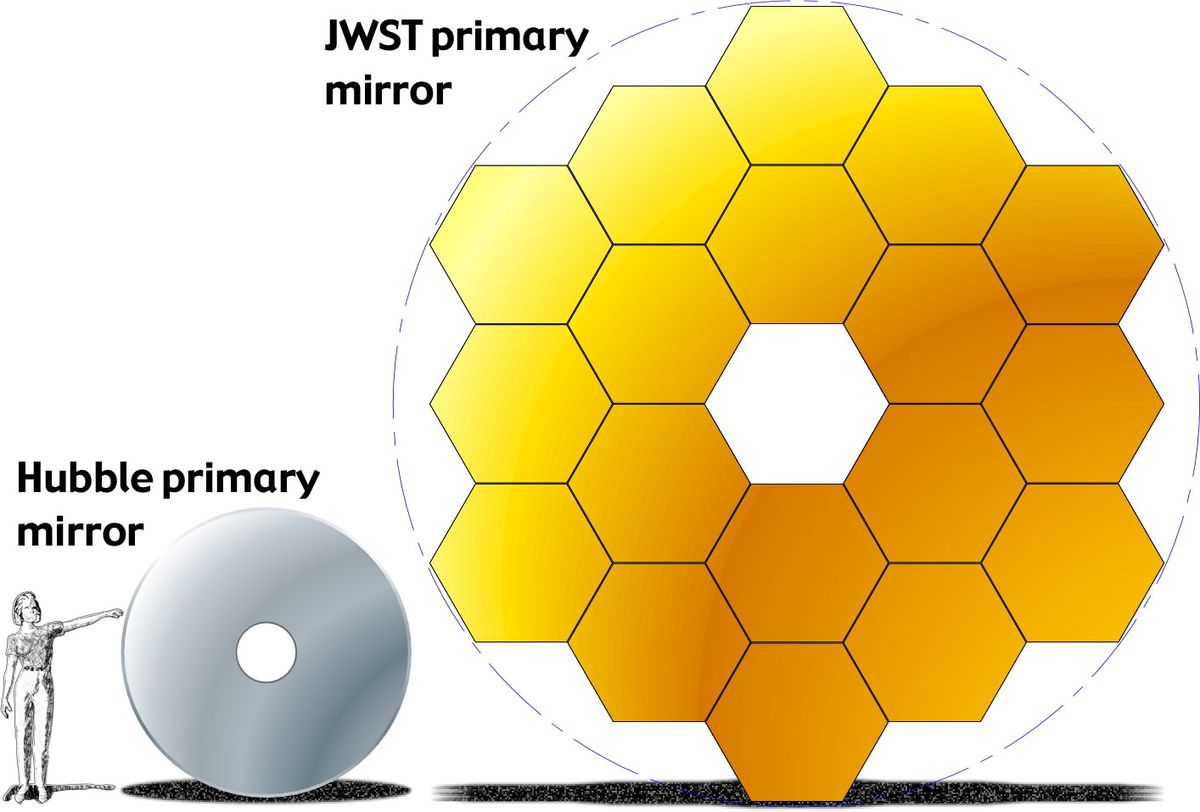
NASA
What does that mean in practice? Well, consider one of Hubble’s most famous images, the Deep Field. In 1995, scientists set the Hubble to stare off into a teeny-tiny patch of sky (about the size of the head of a pinhead, held at arm’s length from the viewer) and capture as much light as it could from that one spot.
The image that came back was astounding. Hubble uncovered thousands of galaxies in this teensy patch of sky, helping us refine the number of galaxies thought to exist in the universe.
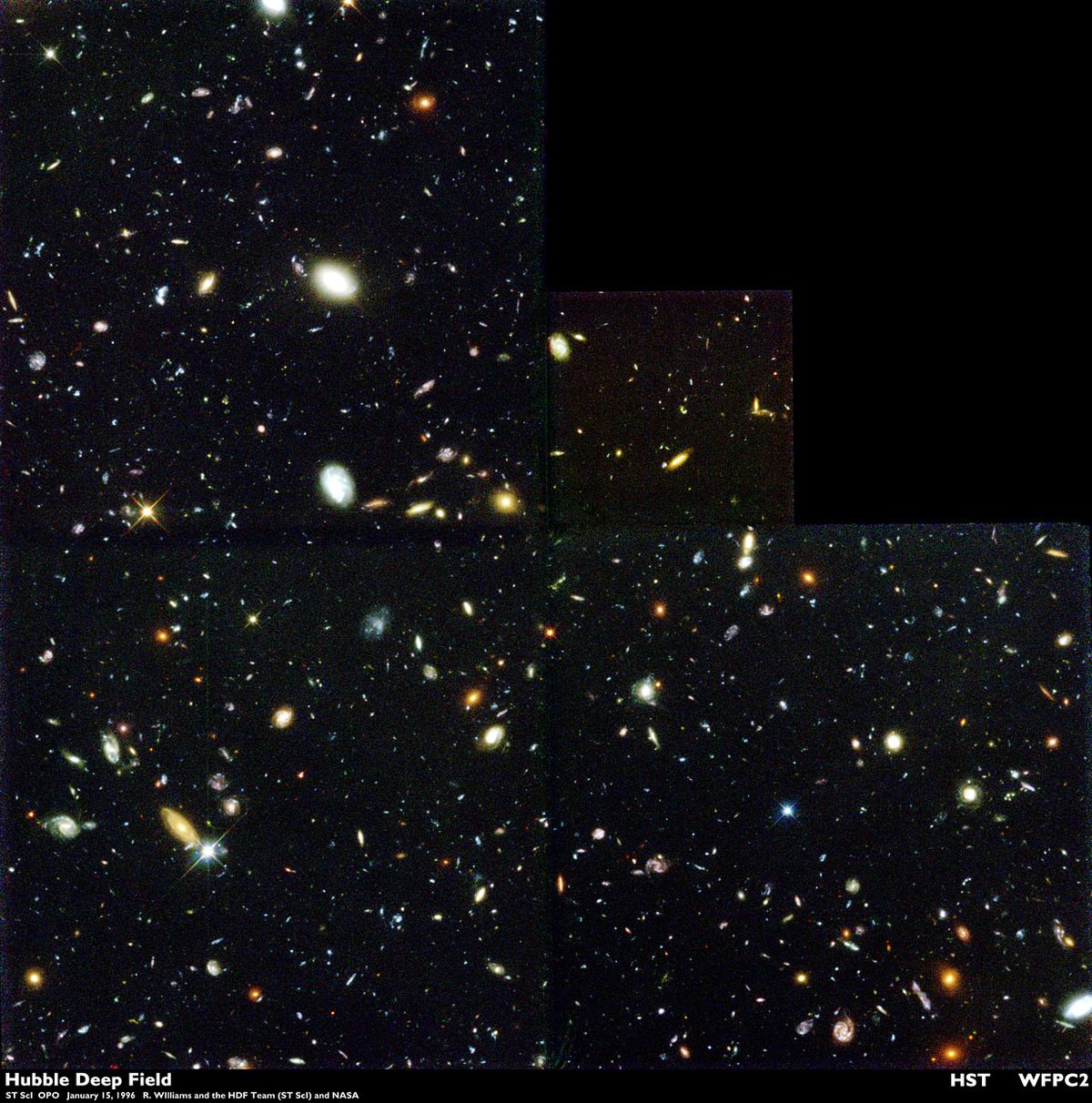
This photograph also revealed Hubble’s larger power — as a time machine. In astronomy, the farther away things are, the older they are (because light from faraway places takes a very long time to travel to Earth). That means this Hubble Deep Field is not only a snapshot of space: It also contains the history of our universe. Galaxies in this image appear to us as they were billions of years ago.
“What Webb will do is take that field and go even further,” UT Austin’s Casey explains. “So the tiny specks of light in the background of the Hubble Deep Field will brighten and become more detailed, we’ll be able to see spiral arms, we’ll be able to see structure, and then we’ll get more specks of light even further in the past. We’re seeing farther back in time with Webb.”
With Webb, astronomers like Casey will be able to see so far back that they’ll potentially spot the very first stars and galaxies. Hubble has seen light dating to about 400 million years after the Big Bang, which took about 13.3 billion years to reach us.
“That’s far! But Webb has the capability to take us to 250 million years after the Big Bang,” explains Casey, who has been approved to work with the Webb Space Telescope. “It might not sound like a big difference. What’s a few hundred million years between friends? Actually, it’s the difference between seeing the first stars that ever turned on [and] arriving a bit too late after the funeral.”
Astronomers call this period when the first starlight shone through the universe “cosmic dawn.” With the Webb, humanity will be able to glimpse at it for the very first time.
Beyond that are barriers through which even the Webb cannot see. Prior to the first starlight, the universe was shrouded by a “dense, obscuring fog of primordial gas,” as the National Science Foundation explains. There’s no light that reaches our telescopes from this time, which is called the cosmic dark ages.
(There is some background radiation from the Big Bang called the cosmic microwave background, a faint glow that shines to us from before the dark ages. But for the most part, the dark ages is a blank spot in our timeline of the universe.)
Casey and other astronomers hope the Webb will help them understand the end of the dark ages and figure out what caused this fog to lift, ushering in cosmic dawn. Scientists suspect the starlight from the earliest galaxies did it.
“If you have a cloud of gas and it encounters energetic light, that energetic light will ionize that gas and disassociate that cloud,” Casey says. “And so if that light just has turned on, it then hits that gas and really transforms the entire universe from a dark place to a light place.”
The Webb telescope sees infrared light — which can be very, very old
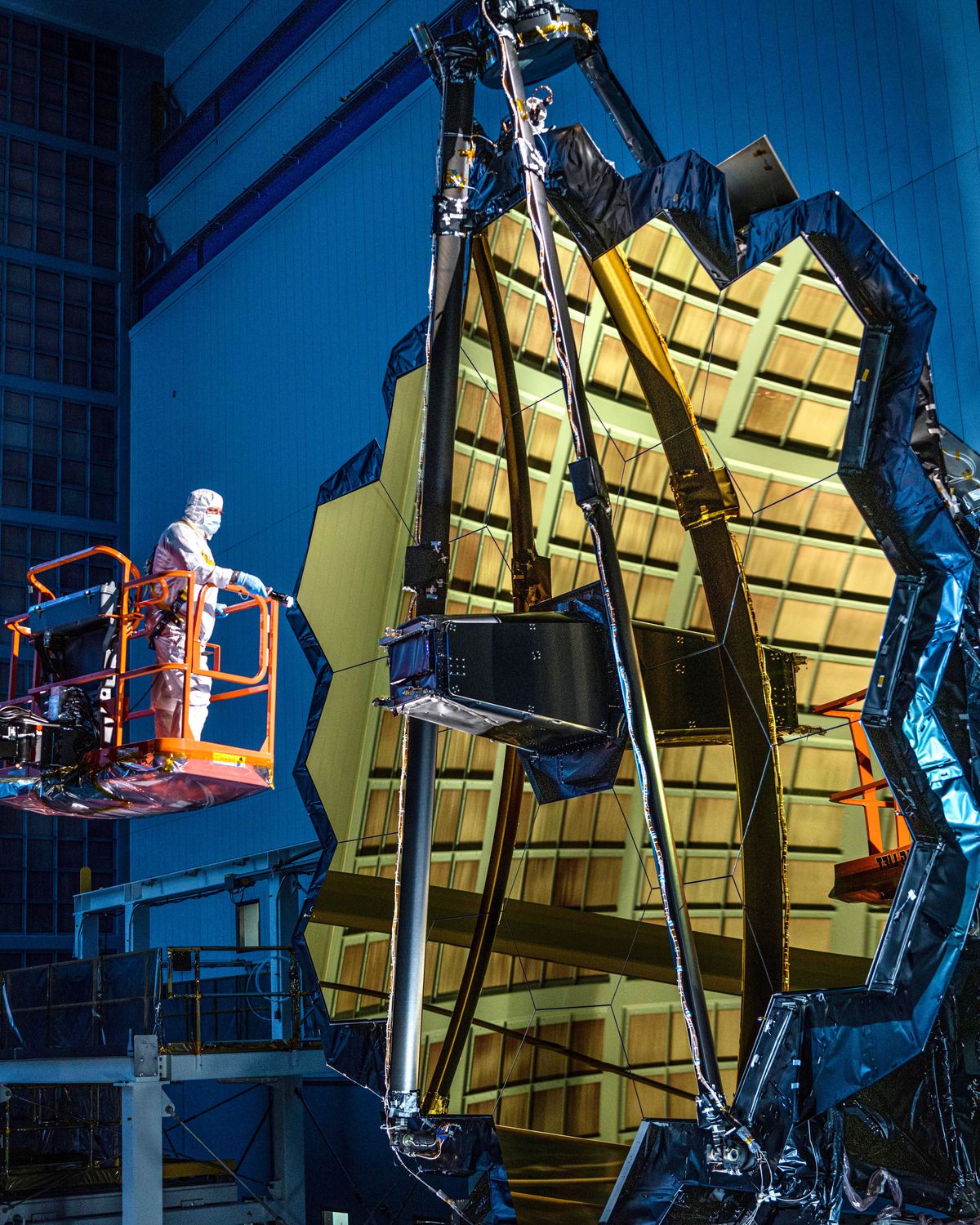
The Webb’s other advantage is the type of light it collects.
Light comes in a lot of different varieties. The human eye can see only a narrow band known as visible light, but the universe contains lots and lots of light outside this range, including the higher-frequency, higher-energy forms: ultraviolet, gamma rays. Then there’s the lower-energy light with longer wavelengths: infrared, microwaves, radio.
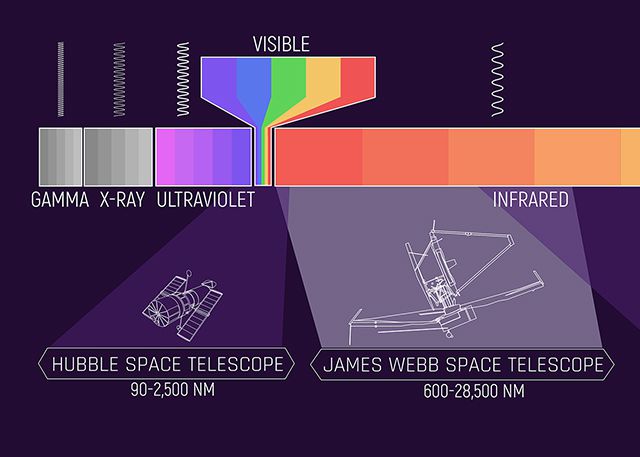
The Hubble Space Telescope collects visible light, ultraviolet, and a little bit of infrared. The Webb is primarily an infrared telescope, so it sees light that’s in a longer wavelength than what our eyes can see. This seems nerdy and technical, but it’s actually what allows Webb to look further back in time than the Hubble.
Infrared light is often very old light, due to a phenomenon call redshifting. When a light source is moving away from a viewer, it gets stretched out, morphing into a longer and longer wavelength, growing redder. (The opposite is true as well: As a light source grows closer, the wavelengths shorten, growing bluer.) It’s similar to what happens when a siren goes by: The pitch increases as the siren approaches, then decreases as it trails away.
Because space is constantly expanding, the farthest things away from us in the universe are moving away from us. “And as light travels through space from those distant galaxies, the light is literally stretched by the expansion of space,” Straughn says.
Imagine a star that’s really far away. The light from that star may start off in the visible spectrum, but it gets stretched on its journey to us. It grows redder and redder. “So when we see distant galaxies with Hubble, they’re sort of these little, tiny red nuggets,” Straughn says. Eventually, these very distant, old galaxies grow so red that they drop into the infrared spectrum. Webb can see this ancient light that has become invisible to the human eye.
Conveniently, infrared light has other uses as well. It’s a really good type of light to use to look at exoplanets. For instance, if you were on a planet that orbits another star and wanted to see Earth, visible light wouldn’t be your best bet.
“The Earth peaks in the infrared,” says Johns Hopkins Applied Physics Laboratory astronomer Kevin Stevenson, who plans to use the Webb in his research. So if we want to be able to study an Earth-like planet in another solar system, “What we really want to do is observe at infrared wavelengths, because that’s where the light from the Earth is being emitted.”
Exoplanet scientists like Stevenson are going to use the Webb to analyze the atmospheres of these worlds: The Webb is capable of determining some of the chemicals in their atmospheres. “We can detect water, CO, CO2, methane,” Stevenson says. While those aren’t definitive signs of life on their own, they could begin to ask fascinating questions: What created that methane and carbon dioxide? Could it have been life?
“We all want to find another Earth, don’t we?” Stevenson says. “The prospect of answering the question ‘are we alone?’ has been something that we’ve been asking ourselves for centuries. And I think with James Webb, this will provide us the first opportunity to really answer that question.”
This $10 billion gadget better not break
Scientists are clearly raring to go, but the Webb revolution has taken a while. One reason for all the launch delays had to do with contractor snafus. But a big source of all of them, NASA’s Straughn says, is the complexity of the Webb itself.
“Because it’s so big, there aren’t any rockets that are big enough to launch it fully deployed,” Straughn says. That’s why the telescope had to be folded up to fit inside a rocket. “So that whole process of building a deployable telescope in space is the source of a lot of the engineering challenges.”
Upping the stakes is the fact that while Hubble was launched to around 340 miles above the Earth, Webb will be almost a million miles away — four times the distance from the Earth to the moon.
It means Webb will be unserviceable by human hands if it breaks. That’s scary, considering the history of the Hubble. Shortly after the Hubble launched in 1990, engineers realized there was a problem with its mirror; the telescope’s initial images came back fuzzy, and astronauts had to launch a space shuttle to fix it. That won’t be possible with the Webb. It just has to work.
It will be far away for good reason. Because Webb is an infrared telescope, it needs to be kept cold. The Earth itself is warm and glows in infrared. “Anything warm glows in infrared light,” Straughn says. “If the telescope was warm, it would just glow and see itself.”
The Webb will orbit around what’s called a Lagrange point. This is a point in space where the telescope can keep cold and, critically, also stay in line with the Earth as both orbit around the sun.
Remarkably, any scientist around the world can apply to use the Webb Space Telescope, provided they write up a project proposal that passes peer review. It’s pretty competitive. In 2020, the Space Telescope Science Institute, which operates space telescopes from John Hopkins University in Maryland, put out a call for proposals for Webb’s first observing run. About a quarter of the proposals were accepted.
“It feels like part of me is still stunned,” says Lisa Dang, a physics PhD student at McGill University who was one of the lucky few to get approved to use the Webb. “And the other part is having this imposter syndrome — like, these data better be really amazing.”
Dang is set to study one of the most extreme planets ever discovered: K2-141 b, a planet 202 light-years from Earth and so close to its host star that its surface is believed to be covered by an ocean of lava. If it has clouds, they are likely made out of vaporized rock, which could then precipitate out “rock rain.” Not much is confirmed about this lava planet, but Dang will use the Webb to study its atmosphere and see what’s possible on this extreme world.
Winning the project proposal “made me feel like an astronomer for the first time,” Dang says. “But it also makes K2-141 b very real suddenly.”
This is the power of an unprecedented telescope such as the Webb. It will help astronomers like Dang fill in the blank spaces of the cosmos.
“It’s wild, when you think about it, that we’re able to piece together the history of what happened before the Earth or the sun even existed,” Casey says.
If all goes according to plan, these kinds of breakthroughs could come in a matter of months.
Update, January 4: This story has been updated with news on the James Webb Space Telescope’s launch and the controversy surrounding the naming of the telescope.